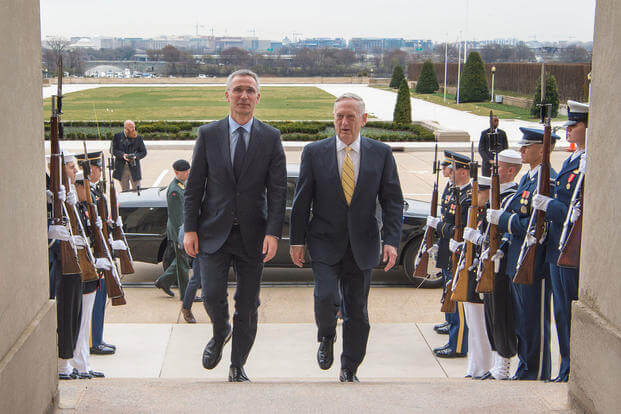NATO is growing stronger with an increasing U.S. commitment despite allies' concerns over recent comments by President Donald Trump, Defense Secretary Jim Mattis said Tuesday.
"We have a very strong trans-Atlantic bond," Mattis said at the start of a meeting at the Pentagon with NATO Secretary General Jens Stoltenberg. "It's getting stronger," he said, though "relationships don't stay the same" in the 28-member NATO alliance. "They are always changing," he said.
"In this case, the bond is getting stronger," Mattis added. "It's built on a legacy of common commitments and common defense and we never forget that in this building."
Stoltenberg ignored shouted questions for comment on reports that Secretary of State Rex Tillerson would skip a meeting of NATO foreign ministers in April but will travel to Russia for high-level talks.
In a statement, Stoltenberg commended Mattis "for your strong personal support and leadership when it comes to NATO and the trans-Atlantic bond." The general's commitment was on display last month at the NATO defense ministerial in Brussels where Mattis pledged an enduring U.S. commitment to the common defense of Europe, Stoltenberg said. "We are very grateful for that," he said.
"I think we all understand that in times of turmoil, in times of uncertainty, the need for strong international institutions like NATO is even greater," Stoltenberg added, "so therefore we need to adapt, we need to strengthen NATO in response to the challenges and the unpredictability we see surrounding us today."
Stoltenberg has been walking a fine line between getting guarantees of continued U.S. support while seeking to ease the increasing concerns of member states over Trump's rhetoric and tweets suggesting that some NATO members were not paying their "fair share" in the alliance.
Only five NATO states – the U.S., Britain, Estonia, Greece and Poland –currently meet or exceed the goal of spending 2 percent of GDP on defense.
Germany and other NATO members were rattled by Trump's comments during the campaign that NATO was "obsolete" and his repeated expressions of admiration for Russian President Vladimir Putin. German also took exception to Trump's tweet last week that the U.S. was owed "vast sums" for supporting NATO.
"Germany owes vast sums of money to NATO & the United States must be paid more for the powerful, and very expensive, defense it provides to Germany," Trump tweeted at the time.
German Defense Minister Ursula von der Leyen hit back Sunday, charging that Trump misunderstood how NATO is financed.
"There is no debtor's account at NATO," she said. "To tie the 2 percent of defense spending, which we want to achieve in the middle of the next decade, only to NATO is wrong."
Von der Leyen added, "Defense spending also goes into United Nations peacekeeping missions, into our European missions and into our contribution to the fight against ISIS terrorism."
In a readout of the private session of the Mattis-Stoltenberg talks, Navy Capt. Jeff Davis, a Pentagon spokesman, said "the two leaders discussed ways to encourage allies to assume a more equitable share of alliance security and defense responsibilities."
Matts met separately later Jussi Niinistö, the defense minister of Finland, which is not a NATO member but works closely with the alliance.
In response to a question on Tillerson's possible absence from the NATO foreign ministers meeting next month, Niinistö said, "Finland is not part of NATO so it's really not our business. We are good partners with NATO, of course, and we would like to see that the United States is represented at the NATO meetings, but after all it is not our business."
On Capitol Hill Tuesday, retired Air Force Gen. Philip Breedlove, the former NATO supreme commander, said the NATO member states must get past their differences to unite against the common threat posed by Russian President Vladimir Putin.
In testimony to the Senate Armed Services Committee, Breedlove said Putin "has made clear that he wants to upend the post-World War II order established in Europe." The retired general said that NATO must adopt "a more forward defensive posture to deal with the Kremlin's challenges in Europe."
-- Richard Sisk can be reached at Richard.Sisk@Military.com.
Don't Miss a Single Military.com Story
To read the full article and get exclusive benefits, sign up today.
It’s FREE
Why am I seeing this? Visit our FAQs



























